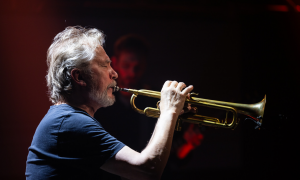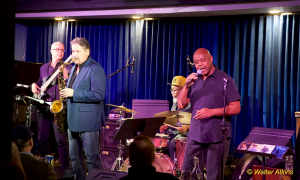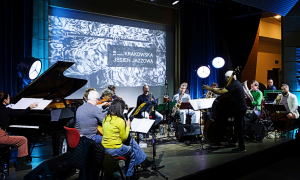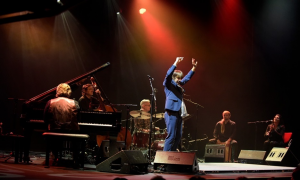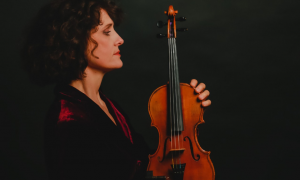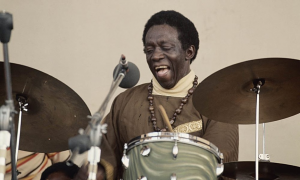Home » Jazz Articles » Live Review » Jazzdor Strasbourg 2015
Jazzdor Strasbourg 2015

Strasbourg
November 10-13, 2015
Jazzdor is a French festival with two annual editions. The main part is held in the Strasbourg area (France) in November and the other one in Berlin (Germany) in June. Both editions present a considerable number of bilateral and multilateral collaborations; an essential part of the festival's philosophy and policy.
The Strasbourg festival is the older home part. It celebrated its 30th edition this year. The Strasbourg festival is spread out over two weeks in November, collaborating with the neighboring German city of Offenburg that also offers a stage for some bigger concerts held. This year's edition from November 6—20, presented more than 30 concerts, including a concert of a special Jazzdor Ensemble led by great French clarinetist Louis Sclavis. In addition to the groups and concerts covered here, the program presented musicians from France (Auditive Connection, Ark 4, Le Bal des Faux Frères, Pascal Contet, Yves Dormoy, Filiamotsa & G.W. Sok, Daunik Lazro, Mathieu Metzger, Eve Risser (Donkey Monkey, White Desert Orchestra), Bernard Struber)), cross-national configurations (Carlos Bica Azul, Hans Lüdemann T.E.E. Ensemble), Northern American contributions (Richie Beirach Kris Davis 5, James Farm, Jason Moran "Fats Waller Dance Party," Archie Shepp) as well as German and Swiss groups (Amor Amok, Joachim Kühn, Plaistow, Sylvie Courvoisier and violinist Mark Feldman made a furioso start with three pieces from John Zorn's "Book of Angels" (album Malphas) and continued fulminant with their own pieces as "For Alice," "Dunes" (album Hotel du Nord), "Orpheus and Eurydice" and "Five Senses Of Keen" (album To Fly To Steal, Live at Théatre Vidy). Bold leaps and explosive configurations arose from their igneous strings and keys. Even to those familiar with these pieces the work sounded fresh and fiery with some great new nuances and turns, especially the speedy clatter originating from a preparation of piano strings. Courvoisier uses these in a very concise and musically highly significant way.
As usual Courvoisier created an accumulation of complex tonal figures abstracted from various sources and coming forth from deep exploration. These figures might be regarded pieces in their own right, pieces in a piece, pieces which progress were concatenated in highly dynamic ways, thus inducing a clear feel of an overarching whole. What she did could even be considered a kind of highly sophisticated acoustic sampling. Though sometimes you may recognize some snippets, it always feels like an utterly genuine creation, far from the more usual and dominant theme-variation-structure. Feldman often took the motivic role, the forward propelling role, and the role of initiating breaks and turns with a stunningly rapid and contrasting combination of (extended) techniques always serving a musical expansion and deepening. The duo's performance was sharp and had great dynamics. It created great momentum, grace, power, and magic. It was a very delightful upbeat to the music of the subsequent group Il Pergolese.
Il Pergolese
There are few places in Europe where secular and religious music, music of the past and the present, folk and classical music, as well as jazz and rock music are so close together and intertwine. Intense vocals, clean bel canto, wild tarantulas or incantatory tammurriata accompanied by violently erupting rhythms: music that celebrates life. Neapolitan folk and art music have in common extraordinarily strong, memorable melodic content and that is what some gifted composers like Pergolese masterfully gave and give shape. This intensity nourishes the music of Il Pergolese. Giovanni Battista Pergolesi (1710—1736), a young and extraordinary composer, created some unforgettable music in his short life and then there are these four musicians, pianist Francois Couturier, cellist Anja Lechner, vocalist Maria Pia De Vito, and percussionist Michele Rabbia, who felt attracted to that music and brought the backwash of Pergolese's creations into audible, tangible being along the traces of time and memory.
Pergolesi is considered one of the founders of the opera buffa, which originated from Naples. With its clear diction and merrily chattering singing it was closer to common people's everyday lives and the vernacular. The music picked up on this part of Pergolesi's work as well as the spiritual work, his "Stabat Mater," which he created in his final year.
The performance appeared a dual kind of thing in various respects. There were two intimate duos at work, Couturier and Lechner on one side, De Vito and Rabbia on the other side. Both have a long collaboration history. There were the delicate arrangements of Couturier and the carefully designed electronic soundscapes of Rabbia that both opened up possibilities and ways to the flourishing of De Vito's and Lechner's voices, and there was the crossfading between Pergolesi's delivered lines and ex tempore zones. Maria Pia De Vito, a Naples native, sang Pergolesi's opera and Stabat Mater creations transferred into her familiar Napolitano dialect 'con intensitá e finezza,' with great intensity and finesse, which—again and again—turned seamlessly into colorful joint extemporizations with Michele Rabbia. It enhanced the touching music of Pergolesi ascending in the audience's senses and descending deeper into the soul. The rich music detached listeners from categorizing and drew them into its beguiling colorful flow of melos and voices. The manifold, vivid and apposite interplay of the four musicians yielded rare moments of a moving musical experience.
Il Pergolese was a fascinating and highly enjoyable example of genre defying music and as a whole a clear highlight Jazzdor Strasbourg—happily—had the courage to present two years after its recording (Il Pergolese (ECM, 2013)). For something like this work, apparently successful precursors are needed.
Polymorphie
Centre Européen d'Actions Artistiques Contemporaines (CEAAC) is a regular place for the afternoon concerts of Jazzdor. Young French troupe Polymorphie, founded by altoist Romain Dugelay, comprises vocalist Marine Pellegrini, the two altoists Romain Dugelay and Clément Edouard, keyboarder Lucas Garnier, Damien Cluzel on baritone guitar and drummer Léo Dumont. It is an unusual enterprise in a field quite usual in French music: spoken word and literary texts. In its present program the troupe musically connects work of Oscar Wilde, Jean Zay, Albertin Sarrazin, Paul Verlaine, and various anonymous poets. Martine Pellegrini lends them her chanting, reciting, spitting, screaming voice. The troupe zigzagged its own way into and out of word qualities by interlocking various vocal and tonal intensities and temperatures. Sounds with rock and free jazz affinities and electronic elements crisscrossed in its vivid performance, making up an appealing mixture of orderly and non-orderly moments. It is a valuable approach yet the troupe can still gain more in terms of urgency, density and rawness.
Michael Alizon/Jean-René Mourot
Like the night before at Strasbourg's Pôle Sud, there was a duo opening before the quartet, this time the Strasbourg duo of saxophonist Michael Alizon and young pianist Jean René Mourot. They played a quite surprising set with music of sober beauty, constructive abstraction, remarkable clarity, and fine unison passages. The duo did not provide the usual comforting anchor points, but followed its own, unbeaten track full of substance with unconventional approaches such as the strong emphasis of Mourot on the left hand and low register at the beginning. Alizon and Mourot displayed a lot of variability, keeping their music both strong and unresolved, and finished with an encore with their noteworthy rendition of the blues. In temperament and temperatures it was a great upbeat to quartet following.
Mark Turner Quartet
Saxophonist Mark Turner, a mainstay for almost two decades now, has elaborated his music to a high degree of sophistication. His music is elusive and dependable, elegant and dense, fiery and cool, sober and strong, with a hint of melancholia. It stays maneuverable, secured by the characteristic contribution of his carefully chosen fellow musicians: the excellent colorful trumpeter Avishai Cohen, steadfast bassist Joe Martin, and drummer Obed Calvaire with his muscularly circling beats. At Strasbourg's Pôle Sud this could be experienced at a high degree live.
Many jazz aficionados highly appreciate his music, which is not that surprising, considering what Turner has to offer: great absorption of the tradition, creativity on a high level within a clearly marked domain, as well as a highly attractive combination of personal und musical characteristics. But first and foremost it is the double horn frontline that presently does not have many serious competitors. In Strasbourg the group played up to the high expectations of the fully satisfied and happy audience. In the encore the group finished formidably with an especially beautiful piece that left nothing to be desired.
Imbs 3
The piano trio, one of the core configurations in jazz, continues to evolve in the wake of the development of new technologies and musical concepts. Hence we can now enjoy trios who have integrated electronics, trios based on the adaptation of rock rhythms, techno and other minimalist concepts, trios in the vein of free improvisation, and song-based trios. These are varieties that can also overlap/intersect. This year's program of Jazzdor offered four piano trios, a trio of French pianist Mathieu Mazué, the trio of German pianist Michael Wollny, Swiss trio Plaistow, and a newly formed trio of pianist Christophe Imbs from Strasbourg with Italian bassist Matteo Bortone (1982), and French drummer Anne Paceo (1984). Anne Paceo is a much in demand multi-genre drummer who works in equal measure in pop, world, funk and jazz. Bortone likewise is much in demand with his own bands, with Italian drummer Roberto Gatto, and many more.
Imbs' trio operated with electronics, rock-and minimalist elements. The trio played pieces with moving repetitive patterns, sometimes extended or overlaid by piano soloing old style. It seemed Imbs and his fellow musicians were primarily focused on gaining suspense, nuances, and variation, rather than punching power and catharsis. It was something still in the process of shelling, finding its own ways to result in a bigger overall effect by accumulation of smaller nuanced punctuating actions like Paceo's excellent cymbal work, Bortone's sensitive bass work or Imbs' 'textures électroniques flottantes.'
PPP
The evening concert with the high profile trio of clarinetist Michel Portal, saxophonist Emile Parisien, and accordionist Vincent Peirani took place in the big hall of theatre L'Illiade of Illkirch-Grafenstaden, a smaller place a few kilometers outside Strasbourg. The big hall was remarkably well-filled by a quite mixed audience, mainly subscribers, that fully enjoyed the unrolling spectacle.
Veteran Michel Portal is a big name in French music, classical as well as jazz and improvised music. Parisien and Peirani are two towering figures of the younger generation. A time ago it seemed reasonable to match Peirani and Portal and then also Parisien. It worked out okay, but in the long run these three musicians of different generations really found each other on a deeper level, which not only allowed them to act more freely, but also to extemporize on stage, at ease on all possible levels with igniting more inspirational pleasure. My initial skepticism was dispelled completely. It revealed as truly magnificent, playful, utterly entertaining and amusing and a feast of and for the music. The three Ps crossed manifold musical areas from fooling around to breathtaking virtuoso rides. I never saw Portal smiling and laughing so much. After the second encore another key P, Philippe Ochem, director of Jazzdor, was asked to join them on stage. In the end the audience celebrated the four magnificent Ps.
Julia Hülsmann Quartet + Theo Bleckmann
German pianist Julia Hulsmann rendered her reworking of German born American composer Kurt Weill (1900-1950) with her quartet extended by German born American vocalist extraordinaire Theo Bleckmann (released on the recent ECM-album A Clear Midnight). Bleckmann had earlier interpreted songs of Weill on his album Berlin: Songs of Love and War, Peace and Exile (Winter&Winter, 2008). The group focused as much on less known pieces for Broadway theatre from the 40s as on a few overly known titles and a few pieces on poems of Walt Whitman. Weill himself put Whitman poems to music, but Hülsmann did not get permission to perform it and decided to compose her own tunes.
It is almost impossible to really use up Weill's songs, but Hülsmann decidedly went for her very own turn that clearly differed from our deeply rooted sound image. As a consequence, even very well-known pieces like "Speak Low," "Alabama Song," "Mack The Knife," and "September Song" underwent a drastic reshaping. Overused pieces like "Mack The Knife" were stripped of their overt expressionist cabaret colors and jazz allusions. These songs were played much slower with Bleckmann's elegantly skating voice -all with a subtle and milder expression of its bittersweet coldness aptly nuanced by Tom Arthurs' trumpet voice. "Speak Low" contained a sophisticated melodic bass line, the radically reduced "Mack The Knife" was introduced by portentous hand drumming of Heinrich Koebberling, and "September Song" in a truly masterful arrangement of bassist Marc Muellbauer gained a brilliant new quality (my personal concert highlight). The Broadway pieces to the contrary wore their American characteristics emphatically. It all ended with a nicely shuffling piece from Weill's unfinished Broadway theatre piece "Huckleberry Finn." It was no feast of recognition, rather it revalued some of the strongest songs of the last century, some of which renditions could bear more reduction still.
Lisbeth Quartet invites Antonin-Tri Hoang
After Hülsmann's group young altoist Charlotte Greve (1988) performed with her Lisbeth Quartet together with guesting French altoist Antonin-Tri Hoang (1989). Charlotte Greve and Antonin-Tri Hoang are two extraordinarily gifted young musicians already remarkably mature and accomplished. Greve, originally from the Berlin scene and one of the most original young German jazz musicians, is now based in New York where she works with her Brooklyn-based group Wood River (guitarist Keisuke Matsuno, (electric) bassist Simon Jermyn, drummer Tommy Crane). Her band Lisbeth Quartett, comprising pianist Manuel Schmiedel, bassist Marc Muellbauer, and drummer Moritz Baumgaertner, has released four albums—Grow (Doublemoon Records, 2009), Constant Travellers (Traumton Records, 2011), Framed Frequencies (Traumton Records, 2014) and on the very day of the concert Lisbeth Live (Traumton Records, 2015).
Paris-based Antonin-Tri Hoang was a member of Orchestre National de Jazz under the direction of Daniel Yvinec from 2009-2013. He participated in the orchestra's Robert-Wyatt-and Astor-Piazzolla-project. On his debut album from 2011 he forms a duo with well-known French pianist Benoit Delbecq. Hoang collaborates with pianist Eve Risser (duo Grand Bazaar and as a member of her White Desert Orchestra) and is also engaged in the bass clarinet quartet WATT, inspired by the work of the composers La Monte Young and Giacinto Scelsi.
The group excellently worked its way through compositions by Greve ("Movement 4," "You & You," "Crickets") and Hoang ("Tombolé" and the stunningly tricky "Jusque"). Pianist Manuel Schmiedel, bassist Marc Muellbauer and drummer Moritz Baumgärtner secured and highly enriched the ongoing weavings. Greve has a gift to figure out beguiling motivic/melodic nuclei rich enough to expand and flourish by shifting, circling and layering, thereby producing brightly shining tonal colors. Huang creates layered and interlocking structures in a different, complementary way. Both are assured musicians deeply dedicated to the flow of the music in the performance. This collaboration exponentially reinforced their potentials. It was stunning how they blended their altos spectralizing or unifying the sound. They reinforced each other, infinitely unfolding, shining and shimmering their lines, converging and slightly diverging thus generating a spiraling and self-energizing recursiveness. The group finished with Greve's piece "Crickets"—a piece based on patterns of cricket chirps. Its beguiling simplicity from which great tonal richness emerged, had a distant relationship with the atmosphere of the modal classic "All Blues." It is the flair and hand of Philippe Ochem, the director of Jazzdor, to scent out, find, and initiate these kinds of pollinations.
Conclusion/resumé
Jazzdor is a festival of esprit, a sensible good spirit, good care and great hospitality. The festival programming works with a core of regulars that secures continuity, recognizability, trust, and which enables embedding of unusual things, young musicians/ensembles, as well as daring and cutting edge "new things." As a visitor you are assured you will always see and experience something special you cannot see or experience elsewhere. The festival comprised an impressive series of solo-concerts (Beirach, Contet, Lazro, Metzger, Wollny) and presented an even more impressive number and range of larger ensembles (Archie Shepp Attica Blues Band, Polymorphie, Hans Lüdemann T.E.E, Ensemble, Eve Risser White Desert Orchestra, Bernard Struber Jazztet, Le Bal Des Faux Frères, Louis Sclavis Jazzdor Ensemble).
Unfortunately, this 30th edition, held on the horrible Friday the 13th of the terror attacks in Paris, cut through the festival night like a knife, which casted a shadow, affected people present, troubled their minds and souls. Not one concert was cancelled after the Friday events, though. The music could not cure these sentiments, but it at least managed to solace, feed and strengthen, bind and encourage troubled minds and souls—no demonstration, but a mindful gathering.
Tags
jazzdor strasbourg 2015
Live Reviews
Henning Bolte
France
Paris
Louis Sclavis
Eve Risser
Hans Lüdemann
Kris Davis
jason moran
archie shepp
Mark Feldman
Francois Couturier
Anja Lechner
Maria Pia de Vito
Michele Rabbia
Jean-René Mourot
Mark Turner
Avishai Cohen
Joe Martin
Obed Calvaire
Michael Wollny
Christophe Imbs
Matteo Bortone
Anne Paceo
Roberto Gatto
Michel Portal
Emile Parisien
Vincent Peirani
Julia Hulsmann
Theo Bleckmann
Tom Arthurs
Heinrich Koebberling
Marc Muellbauer
Charlotte Greve
Antonin-Tri Hoang
Keisuke Matsuno
Simon Jermyn
Tommy Crane
Daniel Yvinec
Benoit Delbecq
Manuel Schmiedel
Moritz Baumgärtner
Comments
PREVIOUS / NEXT
Support All About Jazz
 All About Jazz has been a pillar of jazz since 1995, championing it as an art form and, more importantly, supporting the musicians who make it. Our enduring commitment has made "AAJ" one of the most culturally important websites of its kind, read by hundreds of thousands of fans, musicians and industry figures every month.
All About Jazz has been a pillar of jazz since 1995, championing it as an art form and, more importantly, supporting the musicians who make it. Our enduring commitment has made "AAJ" one of the most culturally important websites of its kind, read by hundreds of thousands of fans, musicians and industry figures every month.













